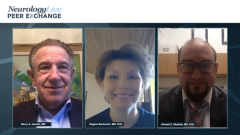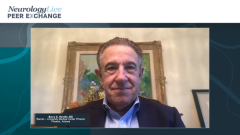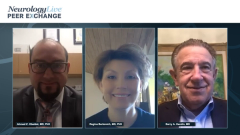
Response to COVID-19 Vaccines in Patients Treated With High Efficacy DMTs
Dr Regina Berkovich evaluates the use of mRNA COVID-19 vaccines in patients treated with high efficacy disease-modifying therapies for MS.
Episodes in this series

Ahmed Z. Obeidat, MD, PhD: I want to talk a little about vaccination. Dr Berkovich, I’m going to come back to you here. Some studies try to see whether there are different responses to vaccination between medications used for multiple sclerosis [MS]. You mentioned earlier the innate and adaptive immune system and the immune system as 1 unit where there’s always interaction. It’s not a humoral vs adaptive. It’s more like the interaction between the immune system as a unit together.
There’s 1 study that we’re going to talk a little about that was published in the spring of 2021 in Therapeutic Advances in Neurological Disorders. This study looked at a specific group of patients with MS who received the mRNA COVID-19 vaccine. It was the Pfizer vaccine in that study. They looked at the antibody responses in people with MS who were untreated vs those who were treated with ocrelizumab [Ocrevus] B-cell depleting therapy, S1P [sphingosine-1-phosphate receptor] modulator fingolimod [Gilenya], or cladribine [Mavenclad]. They looked at the humoral responses to the vaccine through measuring antibodies. You’re going to tell us a little about their main finding. Discuss a little about what you think this is teaching us regarding the need for vaccination, the timing for vaccination, and other aspects of vaccination surrounding those highly effective therapies.
Regina Berkovich, MD, PhD: Indeed, that publication and study done by Anat Achiron, MD, PhD, FAAN, is very interesting and reliable. I know this investigator personally. She’s an extremely conscientious scientist and clinician.
I have very high regard for the data collected. It’s astonishing that the different types of classes of disease-modifying therapies separated themselves in such a remarkable way. The B-cell depletion therapies were associated with about 50% of patients developing antibodies. The S1P modulator fingolimod had no antibodies observed. With the cladribine-treated patients, 100% of patients had the antibodies independent of when the vaccine was given in relation to the drug administration. That’s somewhat surprising in respect to the S1P modulators, because with S1P modulators, at least we don’t see a higher mortality. It’s intricate. We probably still have something to learn about those cases.
But let’s ignore the S1P modulators for a second and compare the B-cell depletion therapies with cladribine and look at the real-world evidence on how patients fared who were unfortunate enough to get COVID-19 and were treated with 2 different groups of medications. Remember, the role of vaccination isn’t just in developing the antibodies. The real role of vaccination is preventing serious disease, hospitalization, high morbidity, and mortality. If we approach from that standpoint, then we see that not only did the cladribine-treated patients have good development of vaccine response, but they also had fewer of the cases of the serious, severe COVID-19 disease requiring hospitalization and ventilation, and less mortality. That’s where the proof of the pudding is.
Ahmed Z. Obeidat, MD, PhD: Yes. You’re bringing in a great point. The antibody measure is 1 thing, but antibody measurement doesn’t mean immunity in a way. It can be, but we don’t know exactly. What we’re looking for are the clinical outcomes. We’re looking to see if people with MS who are on certain therapies may have more difficulty fighting COVID-19 or more serious outcomes by contracting COVID-19 infection. Especially vaccinated patients who may still contract the infection. We know that some people who don’t have the disease or aren’t on immune-suppressing medication can still contract COVID-19 despite vaccination. We know that vaccination is protective but doesn’t completely eliminate the risk. This is why we still encourage patients with MS on any of the therapies to get vaccinated.
To your point, this shed light on some of the humoral responses to vaccination, and B-cell depleting S1P modulators don’t seem to have that robust of humoral response to vaccination compared with cladribine in this particular study.
Transcript Edited for Clarity
Newsletter
Keep your finger on the pulse of neurology—subscribe to NeurologyLive for expert interviews, new data, and breakthrough treatment updates.














